Psalm 137
Psalm 137 is the 137th psalm of the Book of Psalms, and as such it is included in the Hebrew Bible.[1] In English it is generally known as "By the rivers of Babylon", which is how its first words are translated in the King James Version. It is Psalm 136 in the slightly different numbering system of the Greek Septuagint and the Latin Vulgate versions of the Bible. Its Latin title is "Super flumina Babylonis".[2]

The psalm is a communal lament about being in exile after the Babylonian captivity, and yearning for Jerusalem. The psalm is a regular part of Jewish, Eastern Orthodox, Catholic, Anglican and Protestant liturgies. It has been set to music often, and was paraphrased in hymns.
Context and content
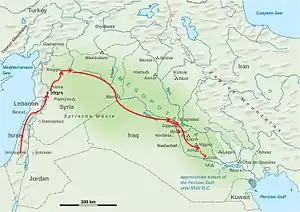
.jpg.webp)
After Nebuchadnezzar II's successful siege of Jerusalem in 597 BC, and subsequent campaigns, inhabitants of the Kingdom of Judah were deported to Babylonia, where they were held captive until some time after the Fall of Babylon (539 BC). The rivers of Babylon are the Euphrates river, its tributaries, and the Tigris river.
Psalm 137 is a hymn expressing the yearnings of the Jewish people during their Babylonian exile. In its whole form of nine verses, the psalm reflects the yearning for Jerusalem as well as hatred for the Holy City's enemies with sometimes violent imagery.
Rabbinical sources attributed the poem to the prophet Jeremiah,[3] and the Septuagint version of the psalm bears the superscription: "For David. By Jeremias, in the Captivity."[4]
Verses 1–4
The early lines of the psalm describe the sadness of the Israelites in exile, weeping and hanging their harps on trees. Asked to "sing the Lord's song in a strange land", they refuse.
| 1. | By the rivers of Babylon, there we sat down, yea, we wept, when we remembered Zion. |
| 2. | We hanged our harps upon the willows in the midst thereof. |
| 3. | For there they that carried us away captive required of us a song; and they that wasted us required of us mirth, saying, Sing us one of the songs of Zion. |
| 4. | How shall we sing the Lord's song in a strange land? |
Verses 5–6
In vv. 5–6 the speaker turns into self-exhortation to remember Jerusalem:
| 5. | If I forget thee, O Jerusalem, let my right hand forget her cunning. |
| 6. | If I do not remember thee, let my tongue cleave to the roof of my mouth; if I prefer not Jerusalem above my chief joy. |
Verses 7–9
The psalm ends with prophetic predictions of violent revenge.
| 7. | Remember, O Lord, the children of Edom in the day of Jerusalem; who said, Rase it, rase it, even to the foundation thereof. |
| 8. | O daughter of Babylon, who art to be destroyed; happy shall he be, that rewardeth thee as thou hast served us. |
| 9. | Happy shall he be, that taketh and dasheth thy little ones against the stones. |
Uses
.jpg.webp)
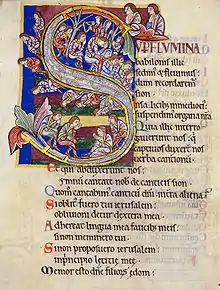
Judaism
The psalm is customarily recited on Tisha B'Av and by some during the nine days preceding Tisha B'Av, commemorating the destruction of the Temples in Jerusalem.
Psalm 137 is traditionally recited before the Birkat Hamazon (Grace After Meals) on a weekday. However, on Shabbat and Jewish holidays, and at the celebratory meal accompanying a Jewish wedding, brit milah, or pidyon haben, Psalm 126 is recited before the Birkat Hamazon instead.[5]
Verses 5 and 6 are customarily said by the groom at Jewish wedding ceremony shortly before breaking a glass as a symbolic act of mourning over the destruction of the Temple.} Verse 7 is found in the repetition of the Amidah on Rosh Hashanah.[6]
Psalm 137 is one of the ten Psalms of the Tikkun HaKlali of Rebbe Nachman of Breslov.[7][8]
Eastern Christianity
In the Eastern Orthodox Church and those Eastern Catholic Churches that use the Byzantine Rite, Psalm 137 (known by its Septuagint numbering as Psalm 136) is a part of the Nineteenth Kathisma (division of the Psalter) and is read at Matins on Friday mornings throughout the year, except during Bright Week (the week following Easter Sunday) when no psalms at all are read. During most of Great Lent it is read at Matins on Thursday and at the Third Hour on Friday, but during the fifth week of Great Lent it is read at Vespers on Tuesday evening and at the Third Hour on Friday.
This psalm is also solemnly chanted at Matins (Orthros) after the Polyeleos on the three Sundays preceding the beginning of Great Lent.
Western Christianity
Following the rule of St. Benedict (530 AD), the Roman Breviary adopted the "Super flumina Babylonis" psalm for Vespers on Wednesdays.[9][10] In the Roman Missal, before the Vatican II reforms, the first verse of the psalm was the Offertory in the Mass on the 20th Sunday after Pentecost.[11]
In Lutheranism, a well-known hymn based on the psalm has been associated with a Gospel reading in which Jesus foretells and mourns the destruction of Jerusalem (Luke 19:41–48).[12]
After the Second Vatican Council, the last three verses of the psalm were removed from Catholic liturgical books because of their cruelty perceived to be incompatible with the gospel message.[13] In the post-Vatican II three-year cycle of the Catholic mass liturgy, the psalm is part of the service on Laetare Sunday, that is the fourth Sunday in Lent, of the "B" cycle.
Similarly, the Prayer Book of the Anglican Church of Canada has also removed these verses.[14]
Translations, versifications and settings
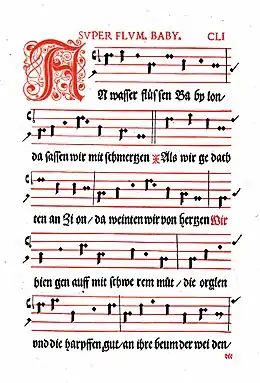
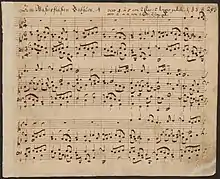
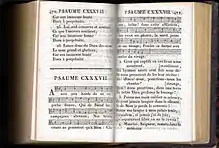



The psalm has been set to music by many composers. Many settings omit the last verse. The hymnwriter John L. Bell comments alongside his own setting of this Psalm: "The final verse is omitted in this metricization, because its seemingly outrageous curse is better dealt with in preaching or group conversation. It should not be forgotten, especially by those who have never known exile, dispossession or the rape of people and land."[15]
16th to 18th century
Latin settings ("Super flumina Babylonis") as four-part motets were composed by Costanzo Festa,[16] Nicolas Gombert,[17] Giovanni Pierluigi da Palestrina[18] and Orlando Lassus.[19] Philippe de Monte[20] and Tomas Luis de Victoria set the text for eight parts.[21] French Baroque settings were written by Henry Dumont,[22] Marc-Antoine Charpentier, 2 settings, H.170 (1670) and H.171-H.171 a (? late 1670)[23] and Michel-Richard Delalande.[24]
Wolfgang Dachstein's "An Wasserflüssen Babylon", a German rhymed paraphrase and setting of the psalm, was first published in 1525.[25] It was soon adopted as a Lutheran hymn, and appeared in publications such as the Becker Psalter.[26][27] A manuscript written in the early 17th century and a 1660s print illustrate that Dachstein's version of the psalm was adopted in Ashkenazi culture.[28] Four-part chorale settings of Dachstein's hymn were realised by, among others, Johann Hermann Schein[29][30] and Heinrich Schütz.[27][31] Schütz also set Luther's prose translation of Psalm 137 ("An den Wassern zu Babel", SWV 37, included in the Psalmen Davids, Op. 2, 1619).[32][33] Organ compositions based on Dachstein's hymn include Johann Adam Reincken's An Wasserflüssen Babylon, and one of Johann Sebastian Bach's Great Eighteen Chorale Preludes.[25]
The first composition in Eustache Du Caurroy's Meslanges de la musique, published in 1610, a year after the composer's death, is "Le long des eaux, ou se bagne", a six-part setting of Gilles Durant de la Bergerie's paraphrase of Psalm 137.[34][35][36] Salamone Rossi (1570–1630) set the psalm in Hebrew (עַל נַהֲרוֹת בָּבֶל, Al naharot Bavel) for four parts.[37] Matthew Locke's Super flumina Babylonis motet is an extended setting of the first nine verses of the psalm.[38][39] The psalm's first two verses were used for a musical setting in a round by English composer Philip Hayes.[40] William Billings adapted the text to describe the British occupation of Boston in his anthem "Lamentation over Boston".[41][42]
19th century
Lord Byron's "We sat down and wept by the waters", a versified paraphrase of Psalm 137, was published in his Hebrew Melodies in 1815. The poetry was set by, among others, Isaac Nathan (1815) and Samuel Sebastian Wesley (c. 1834). The poem was translated in French by Alexis Paulin Paris, and in German by Adolf Böttger. A German translation by Franz Theremin, "An Babylons Wassern gefangen", was set by Carl Loewe (No. 2 of his Hebräische Gesänge, Op. 4, 1823). Another German translation was set by Ferruccio Busoni ("An Babylons Wassern wir weinten" in Zwei hebräische Melodien von Lord Byron, BV 202, 1884).[43][44]
Psalm 137 was the inspiration for the famous slave chorus "Va, pensiero" from Giuseppe Verdi's opera Nabucco (1842).[45] Charles-Valentin Alkan's piano piece Super flumina Babylonis: Paraphrase, Op. 52 (1859), is in the printed score preceded by a French translation of Psalm 137.[46][47] Charles Gounod set "Près du fleuve étranger", a French paraphrase of the psalm, in 1861.[48][49] In 1866 this setting was published with Henry Farnie's text version, as "By Babylon's wave: Psalm CXXXVII".[50][51]
In 1863, Gabriel Fauré wrote a Super Flumina Babylonis for mixed chorus and orchestra. Peter Cornelius based the music of his paraphrase of Psalm 137, "An Babels Wasserflüssen", Op. 13 No. 2 (1872), on the "Sarabande" of Bach's third English Suite.[52][53] Czech composer Antonín Dvořák (1841–1904) set verses 1–5 to music as No. 7 of his Biblical Songs (1894).[54][55]
20th and 21st centuries
20th and 21st-century settings based on, or referring to, Psalm 137 include:
- Super flumina Babylonis (1916) for mixed choir and organ, by Jules Van Nuffel.[56]
- In William Walton's Belshazzar's Feast, a 1931 cantata, a version of the opening section is set to music, as if sung by the Israelite captives in Babylon.[57]
- The second of the Two Psalms by Harry Partch (1901–1974) is "By the Rivers of Babylon", which he recorded in 1942 in a version for voice, chromelodeon and adapted viola.[58]
- An English setting ("By the Rivers of Babylon") by David Amram (b. 1930), for solo soprano and SSAA choir (1969).[59][60][61]
- "Rivers of Babylon", in part based on the opening verses of the Psalm, is a Rastafarian song written and recorded by Brent Dowe and Trevor McNaughton of the Jamaican reggae group The Melodians in 1970. It is featured in the 1972 film The Harder They Come and well known through its hit single 1978 rendition by Boney M. In 1992, the rock/reggae group Sublime released a live cover of the song on their 40oz. to Freedom album.[62]
- The psalm was set, as On the Willows, in the Stephen Schwartz Broadway musical Godspell (1971).[63]
- Don McLean covered Hayes's round as 'Babylon', which was the final track on his 1971 album American Pie. Another cover of the round was featured at the end of the episode Babylon during the first season of Mad Men.[64]
- Estonian composer Arvo Pärt composed An den Wassern zu Babel saßen wir und weinten in 1976 (revised 1984).[65]
- In 1981, Herbert Sumsion composed In Exile, a motet for double choir on verses 1–6, premiered at the Gloucester Cathedral.[66]
- It was the inspiration for Leonard Cohen's "By the Rivers Dark" on his 2001 album Ten New Songs.[67]
- Psalm 137:5–6 is the basis for the chorus of Matisyahu's single "Jerusalem" (2006).[68]
- Psalm 137 is the central text of John Tavener's "Lament for Jerusalem – a mystical love song".[69][70]
- The artist Fernando Ortega based the song "City of Sorrows" on Psalm 137.
- "I Hung My Harp Upon the Willows" is a song by The Trashcan Sinatras about poet Robert Burns.
- It is referenced in The Mountain Goats' "September 15th 1983" off of Heretic Pride.
In literature
- The title of William Faulkner's If I Forget Thee, Jerusalem (1939).
- The Portuguese 16th century poet Luís de Camões's poem Sôbolos rios que vão por Babilónia is based on Psalm 137.
- Welsh poet Evan Evans' work "A Paraphrase of Psalm CXXXVII" is a direct answer to Psalm 137 and parallels the plight of the Welsh bards with that of the Jews in the psalm.
- In Samuel Richardson's 1740 novel Pamela; or, Virtue Rewarded, Pamela adapts psalm 137 to describe her spiritual exile from home.
Phrases from the psalm have been referenced in numerous works, including:
- In the third stanza, The Fire Sermon, of T. S. Eliot's 1922 poem The Waste Land line 182 is: 'By the waters of Leman I sat down and wept...'. Leman is both the French for Lake Geneva and an archaic word for "mistress".[71]
- "By the Waters of Babylon", 1937 short story by Stephen Vincent Benét.
- By Grand Central Station I Sat Down and Wept, 1945 prose poem by Elizabeth Smart.
- The Italian poet Salvatore Quasimodo quoted the psalm in his 1947 poem "On the Boughs of the Willows".
- "If I Forget Thee, Oh Earth", a short story written by Arthur C. Clarke and first published in 1951 in the magazine Future.
- By the River Piedra I Sat Down and Wept, 1994 novel by Paulo Coelho.
- In Job: A Comedy of Justice by Robert A. Heinlein, the last line of this psalm is referenced to depict the potential nature of God.
- In Book X, Chapter 7 of The Brothers Karamazov, Captain Snegiryov quotes verses 5 and 6.
- In the Fallout New Vegas video game, Honest Hearts DLC, Joshua Graham quotes Psalm 137, likening the Babylonian captivity of the Jews to the White Legs' war with two other tribes, the Dead Horses and the Sorrows.
Historical instances of use
- Pope Gregory X quoted Psalm 137 ("If I forget thee, O Jerusalem, let my right hand forget her cunning") before departing from the Crusades upon his election by the papal conclave, 1268–1271.
- In his "What to the Slave Is the Fourth of July?"[72] speech, Frederick Douglass compared the Rochester Ladies' Anti-Slavery Society asking him to deliver their Fourth of July speech to the actions of the antagonists asking the Jews to sing in a foreign land.
References
- Mazor, Lea (2011). "Psalms, Book of". In Berlin, Adele; Grossman, Maxine (eds.). The Oxford Dictionary of the Jewish Religion. Oxford University Press. ISBN 978-0-19-973004-9.
- Parallel Latin/English Psalter / Psalmus 136 (137) Archived 2017-05-07 at the Wayback Machine medievalist.net
- James L. Kugel, "Psalm 137," in In Potiphar's House: The Interpretive Life of Biblical Texts. (Cambridge, MA: Harvard University Press, 1994)
- translated from the Greek Septuagint by the Holy Transfiguration Monastery. (1974). The Psalter According to the Seventy. 1987, second printing. Boston MA: Holy Transfiguration Monastery. p. 241. ISBN 0-943405-00-9.
- Scherman, Rabbi Nosson (2003). The Complete Artscroll Siddur (3rd ed.). Mesorah Publications, Ltd. p. 183. ISBN 9780899066509.
- The Complete Artscroll Machzor for Rosh Hashanah page 324
- Weintraub, Rabbi Simkha Y. (2018). "Psalms as the Ultimate Self-Help Tool". My Jewish Learning. Retrieved 25 September 2018.
- Greenbaum, Rabbi Avraham (2007). "The Ten Psalms: English Translation". azamra.org. Retrieved 25 September 2018.
- Règle de saint Benoît, traduction de Prosper Guéranger, (Abbaye Saint-Pierre de Solesmes, réimpression 2007) p47.
- Psautier latin-français du bréviaire monastique, p. 514, 1938/2003.
- Super flumina Babylonis (Offertory): Free scores at the Choral Public Domain Library (ChoralWiki)
- Leahy, Anne (2011), J. S. Bach's "Leipzig" Chorale Preludes: Music, Text, Theology, Scarecrow Press, p. 37, ISBN 978-0810881815
- Marc Girard (May 2006). Faut-il prier au complet le psaume 136 (137)? (in French) at www
.spiritualite2000 (website of the Dominican Order of Canada).com - http://prayerbook.ca/resources/bcponline/psalter/
- Bell, John L. (1993). Psalms of Patience, Protest and Praise. Wild Goose Publications. ISBN 0-947988-56-4.
- Super flumina Babylonis (Festa, Costanzo): Scores at the International Music Score Library Project
- Super flumina Babylonis (Nicolas Gombert): Free scores at the Choral Public Domain Library (ChoralWiki)
- Super flumina Babylonis (Palestrina, Giovanni Pierluigi da): Scores at the International Music Score Library Project
- Super flumina Babylonis (Lassus, Orlande de): Scores at the International Music Score Library Project
- Super flumina Babylonis / Philippe de Monte (1521-1603) Hyperion
- Super flumina Babylonis (Victoria, Tomás Luis de): Scores at the International Music Score Library Project
- VIAF, ID VIAF : 174850718 (oeuvre). "Super flumina Babylonis".
- Super flumina Babylonis . H 171 / psaume / Marc Antoine Charpentier (1643-1704) French National Library
- Super flumina Babylonis, S.13 (Lalande, Michel Richard de): Scores at the International Music Score Library Project
- Terry, Charles Sanford. "Bach's Chorals. Part III: The Hymns and Hymn Melodies of the Organ Works". oll.libertyfund.org. Retrieved 24 February 2018.
- Becker, Cornelius (1602). "Der CXXXVII. Psal.". Der Psalter Dauids Gesangweis: Auff die in Lutherischen Kirchen gewöhnliche Melodeyen zugerichtet (in German). Leipzig: Jakob Apel.
- SWV 242 / Becker Psalter - Psalm 137 - An Wasserflüssen Babylon Heinrich-Schütz-Haus
- Matut 2011, I: pp. 50–55, 64; II: pp. 101–108.
- Johann Hermann Schein (1627). Cantional, Oder Gesangbuch Augspurgischer Confession. Leipzig: Schein, pp. 325–327
- Gottfried Vopelius (1682). Neu Leipziger Gesangbuch. Leipzig: Christoph Klinger, pp.706–709
- Becker Psalter, Op.5 (Schütz, Heinrich): Scores at the International Music Score Library Project
- Psalmus 136 (137) / Psalm 136 (137) at LiederNet website.
- Psalmen Davids sampt etlichen Moteten und Concerten, Op.2 (Schütz, Heinrich): Scores at the International Music Score Library Project
- BNF 42964084c
- DU CAURROY, Eustache (1549-1609) : MÉLANGES at philidor
.cmbv .fr - Le long des eaux, où se bagne at LiederNet website.
- Cantiques, chants, psaumes et hymnes (Rossi, Salamone): Scores at the International Music Score Library Project
- Buelow 2004, pp. 298–299.
- Matthew Locke: Anthems, Motets and Ceremonial Music at Hyperion website.
- The Muses Delight: Catches, Glees, Canzonets and Canons by Philip Hayes (London, 1786)
- Stowe 2016, pp. 68–74.
- Stowe (2012). "Babylon Revisited: Psalm 137 as American Protest Song". Black Music Research Journal. 32 (1): 95–112. doi:10.5406/blacmusiresej.32.1.0095. JSTOR 10.5406/blacmusiresej.32.1.0095. S2CID 154371943.
- We sat down and wept by the waters, We sat down and wept by the waters / An den Wassern zu Babel and Zwei hebräische Melodien von Lord Byron für eine Singstimme mit Klavierbegleitung at LiederNet website.
- Loewe-Album (Loewe, Carl), Lyrische Fantasien, Alledorien, Hymnen und Gesänge. Hebräische Gesänge (Loewe, Carl), 2 Lieder, Op.15, BV 202 (Busoni, Ferruccio): Scores at the International Music Score Library Project
- Cullen Schippe; Chuck Stetson (2006). The Bible and Its Influence. BLP Publishing. pp. 176–. ISBN 978-0-9770302-0-0.
- Robert Rimm (2002). The Composer-pianists: Hamelin and The Eight. Hal Leonard Corporation. pp. 300–. ISBN 978-1-57467-072-1.
- Super flumina Babylonis, Op.52 (Alkan, Charles-Valentin): Scores at the International Music Score Library Project
- Près du fleuve étranger at LiederNet website.
- "Près du fleuve étranger" (Gounod, Charles): Scores at the International Music Score Library Project
- OCLC 47878235
- By Babylon's wave (score) at Archive.org website.
- Psalmus 136 (137) / An Babels Wasserflüssen at LiederNet website.
- 3 Psalmlieder, Op.13 (Cornelius, Peter): Scores at the International Music Score Library Project
- James Laster; Diana Reed Strommen (2003). Catalogue of Vocal Solos and Duets Arranged in Biblical Order. Scarecrow Press. p. 73. ISBN 978-0-8108-4838-2.
- Biblical Songs at www
.antonin-dvorak .cz - Leytens, Luc. "Van Nuffel, Jules, Biografie". Studiecentrum voor Vlaamse Muziek. Retrieved 22 February 2017.
- Robert Ignatius Letellier (23 June 2017). The Bible in Music. Cambridge Scholars Publishing. pp. 283–. ISBN 978-1-4438-6848-8.
- S. Andrew Granade (2014). Harry Partch, Hobo Composer. Boydell & Brewer. pp. 225–. ISBN 978-1-58046-495-6.
- James H. Laster (11 June 1996). Catalogue of Choral Music Arranged in Biblical Order. Scarecrow Press. p. 625. ISBN 978-1-4617-2664-7.
- David Amran (1969). By the rivers of Babylon: women's chorus (SSAA) a cappella and soprano solo. C. F. Peters
- Music: the AGO & RCCO Magazine, Vol. 3 (1969), page 28.
- Stowe 2016, pp. 51–56, 205.
- Paul R. Laird (10 April 2014). The Musical Theater of Stephen Schwartz: From Godspell to Wicked and Beyond. Scarecrow Press. pp. 38–. ISBN 978-0-8108-9192-0.
- Stowe 2016, pp. 56–.
- Andrew Shenton (10 May 2018). Arvo Pärt's Resonant Texts: Choral and Organ Music 1956–2015. Cambridge University Press. pp. 54–. ISBN 978-1-107-08245-8.
- Music and Musicians. 1981. p. 45.
- Jeff Burger (1 April 2014). Leonard Cohen on Leonard Cohen: Interviews and Encounters. Chicago Review Press. pp. 491–. ISBN 978-1-61374-758-2.
- Stowe 2016, pp. 63–64.
- Tavener, John; Rozario, Patricia; Josey, Christopher; Sydney Philharmonia Choirs (2004). "Lament for Jerusalem a mystical love song" (CD). Australian Broadcasting Corporation. ABC 476 160-5. Retrieved 6 September 2014. Cite journal requires
|journal=(help) - Siobhán Dowling Long; John F. A. Sawyer (3 September 2015). The Bible in Music: A Dictionary of Songs, Works, and More. Rowman & Littlefield Publishers. p. 38. ISBN 978-0-8108-8452-6.
- Ferrall, Charles (2001). Modernist Writing and Reactionary Politics. Cambridge University Press. p. 88. ISBN 0-521-79345-9.
- Oration, delivered in Corinthian Hall, Rochester, by Frederick Douglass, July 5th, 1852.
Sources
- Buelow, George J. (2004). A History of Baroque Music. Indiana University Press. ISBN 9780253343659.
- Matut, Diana (2011). Dichtung und Musik im frühneuzeitlichen Aschkenas: Ms. opp. add. 4° 136 der Bodleian Library, Oxford (das so genannte Wallich-Manuskript) und Ms. hebr. oct. 219 der Stadt- und Universitätsbibliothek, Frankfurt a. M. [Poetry and Music in Ashkenazi culture of the early modern period: Ms. opp. add. 4° 136 of the Bodleian Library, Oxford (the so-called Wallich Manuscript) and Ms. hebr. oct. 219 of the Frankfurt City and University Library]. Studies in Jewish History and Culture (in German). 29. Brill. ISBN 9789004181946.
- Stowe, David W. (2016). Song of Exile: The Enduring Mystery of Psalm 137. Oxford University Press. ISBN 978-0-19-046683-1.
External links
| Wikisource has original text related to this article: |
| Wikimedia Commons has media related to Psalm 137. |
- Pieces with text from Psalm 137: Scores at the International Music Score Library Project
- Psalm 137: Text, translations and list of free scores by several composers at the Choral Public Domain Library (ChoralWiki)
- By the rivers of Babylon text and footnotes, usccb.org United States Conference of Catholic Bishops
- Psalm 137:1 introduction and text, biblestudytools.com
- Psalm 137 – The Mournful Song of the Exiles enduringword.com
- Hymns for Psalm 137 hymnary.org
- Hebrew text of verses 5–6, translation, transliteration, and recordings on the Zemirot Database
- Psalm 137 at the Bible Gateway, NIV